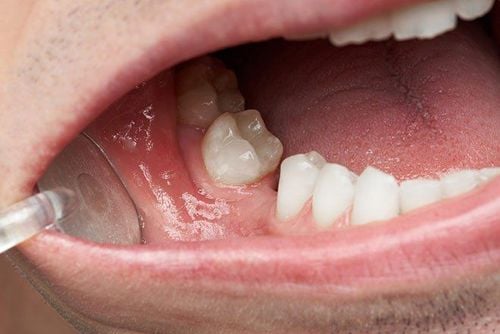This is an automatically translated article.
The article is expertly advised by MSc. Doctor Vu Thi Duyen - Doctor of Nephrology - Endocrinology, Department of Examination & Internal Medicine - Vinmec Hai Phong International General Hospital.When high blood sugar in the body persists for a certain period of time, it can lead to serious problems for your health. It can increase the risk of complications from other diseases such as: cardiovascular disease, kidney disease, neurological disease, eye disease, brain disease or stroke.
Here are 7 “favorable and high risk factors” that make your blood sugar spike and hard to control.
1. Diet
Regular monitoring of your daily diet is considered one of the most important things to help you control blood sugar well.Carbohydrates (including sugars and starches) found in foods can be the cause of your blood sugar spikes. Therefore, you should use it in moderation and rationally to control blood sugar well.
When you eat too many carbohydrates that can cause your blood sugar to rise, such as white rice, pasta and fried, or highly processed foods. There are also some other fruits that also contain high sugar content such as: Bananas, grapes, watermelon, but you can still eat them a little every day as long as you don't eat too much.
To reduce the risk of excessively high blood sugar you should use healthy carbs such as: Bread, whole grains, brown rice, yogurt.
Besides, a rich source of fiber is also very useful for health in general as well as for lowering blood sugar in particular. Some foods that are high in fiber that you should include on a daily basis include whole grains, low-sugar fruits (apples, guava, cucumbers and blueberries) vegetables or legumes.

Việc ăn quá nhiều carbs có thể khiến cho lượng đường trong máu của bạn tăng cao
2. Not getting enough sleep
Inadequate rest can make you feel tired and even affect your level of blood sugar control and breakdown which has a very high risk of raising blood sugar.When you don't get enough sleep, it will make the body's ability to metabolize sugar difficult, leading to increased blood sugar levels.
It is best to build and plan a regular schedule of rest, do not use electronic devices such as phones or tablets near bedtime, to avoid affecting quality sleep. If you find it difficult to sleep at night, you can refer to 17 tips to sleep better at night.
3. Exercise too much or too little
Just a little bit of exercise, such as walking or doing light housework, can help lower your blood sugar and improve the way your body responds to insulin.If you exercise or exercise too little, it will cause blood sugar to rise. On the other hand, too much exercise has similar consequences. Intense physical exercise, such as lying down with weights, can also raise your blood sugar.
It's best to talk with your health care professional about your body's condition to determine what exercise is right for you, helping to keep blood sugar levels within the allowable range. .
4. Tension
When you are under extreme stress, your hormone levels will increase. At this time, the body will burn stored energy sources, including glucose and fat, to deal with stress.To prevent excessive stress, take more care of yourself by eating right, maintaining a daily exercise routine. In addition, you should also learn to relax through meditation, yoga or massage exercises. Or refer to 16 simple ways to reduce stress and anxiety to find the most suitable regimen for you.

Khi bạn bị căng thẳng quá mức nồng độ hormone của bạn sẽ tăng lên
5. Use of certain drugs
Certain medications can raise your sugar levels, including:Corticosteroids, Diuretics Drugs for depression Blood pressure medications If you are taking any of these medicines and notice your blood sugar levels If your blood pressure is high, talk to your doctor as soon as possible. Your doctor can then advise you on how to adjust your diet or medication use.
6. Poor oral hygiene
If you have diabetes you are also at increased risk of gum disease. Severe gum disease can make blood sugar control more difficult.Therefore, you should focus on taking care of your teeth more often by brushing your teeth about 2 times a day, flossing and rinsing your mouth with antiseptic water regularly to remove food residues as well as bacteria. harmful in the mouth.
In addition, you should also visit the dentist every year to check the condition of your teeth. If you have gum disease or any other infection, try to treat it as soon as possible.

Bệnh nướu răng nghiêm trọng có thể khiến việc kiểm soát lượng đường trong máu trở nên khó khăn hơn
7. Smoking
If you regularly smoke, this bad habit can increase your risk of diabetes.In case you already have diabetes, smoking will make it more difficult for your body to control blood sugar. Therefore, if you are smoking cigarettes every day, try to give them up today.
Especially for people with a history of diabetes, gestational diabetes must regularly monitor blood sugar. From there, it is possible to accurately classify the type of diabetes, develop a nutritional regimen, and monitor to minimize the risks and complications caused by diabetes.
Please dial HOTLINE for more information or register for an appointment HERE. Download MyVinmec app to make appointments faster and to manage your bookings easily.
Reference source: webmd.com












